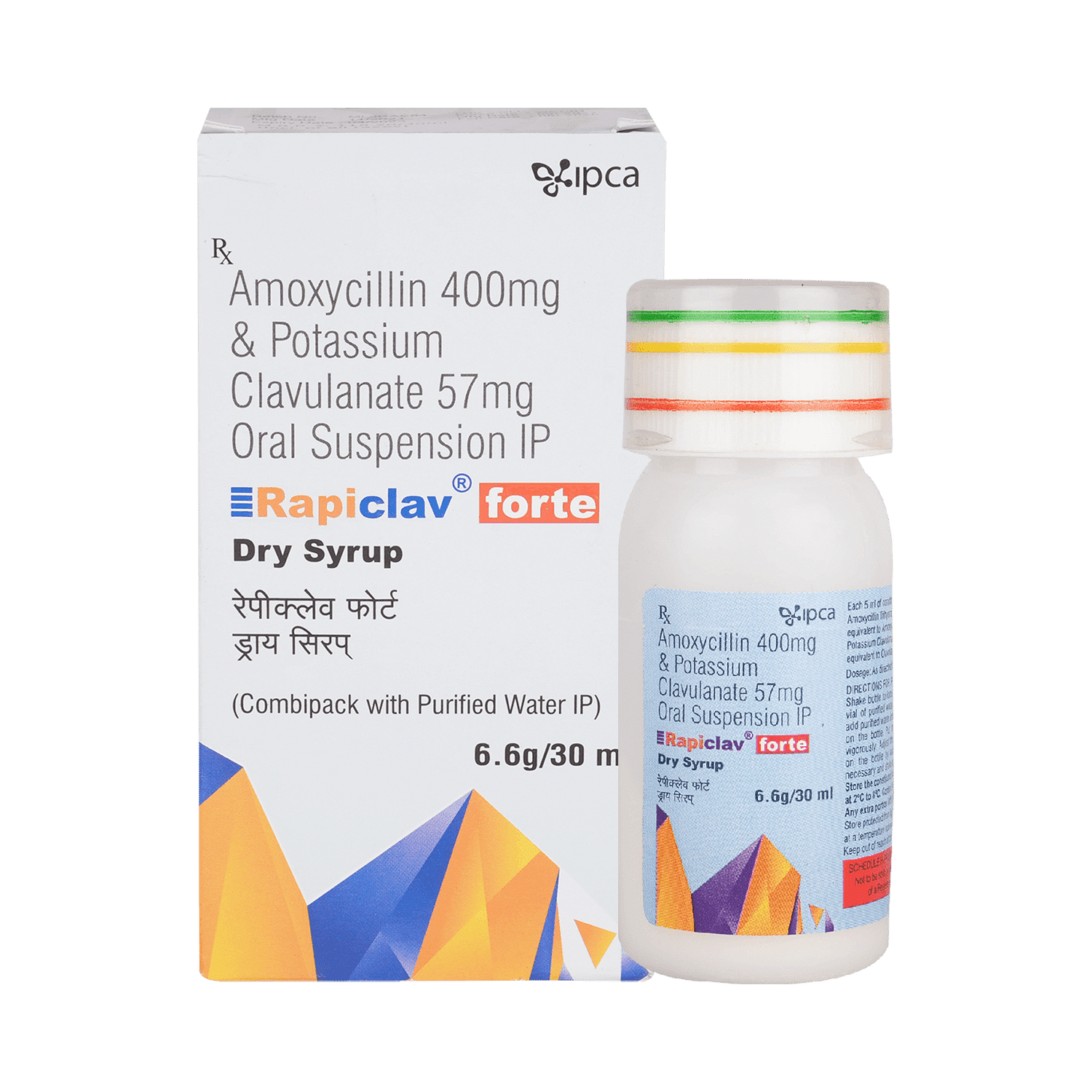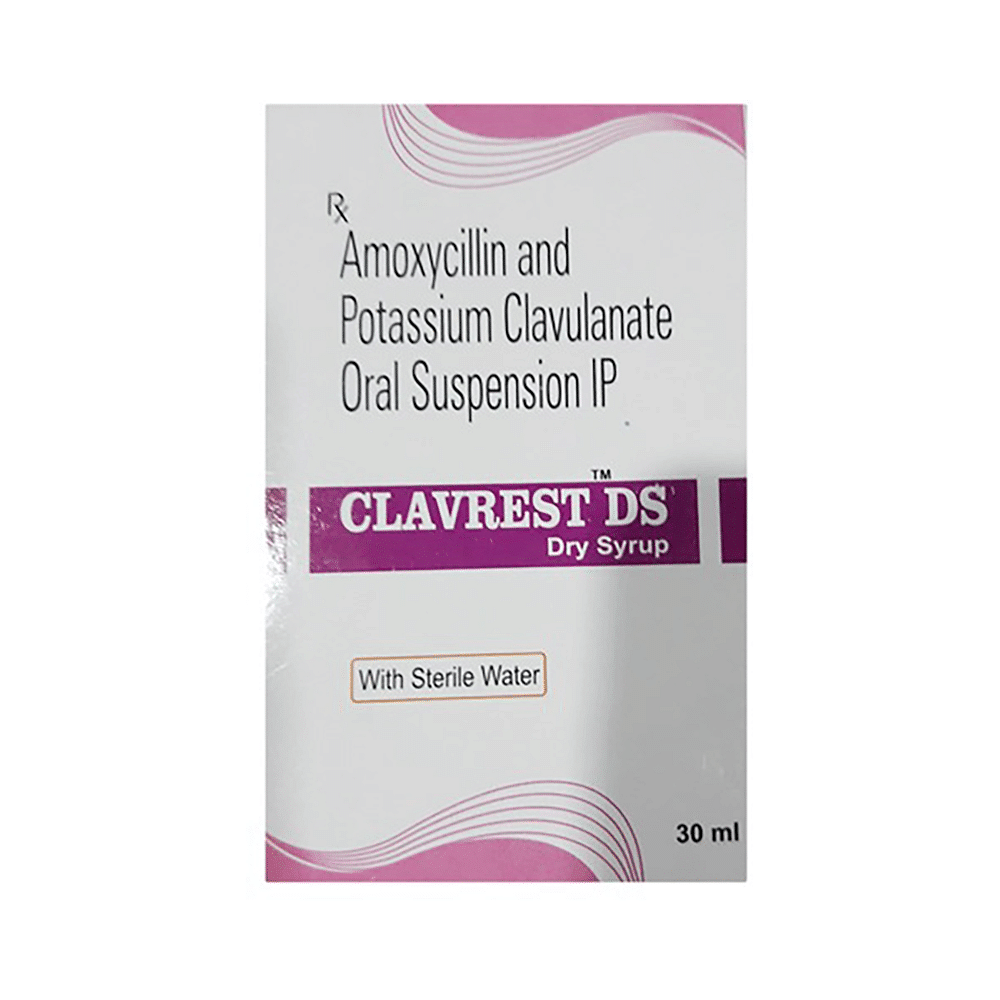
Amoxyfer CV DS Dry Syrup
Manufacturer
Feravix Lifesciences
Salt Composition
Amoxycillin (400mg) + Clavulanic Acid (57mg)
Key Information
Short Description
Amoxyfer CV DS Dry Syrup is an antibiotic medicine that helps treat bacterial infections of the ear, nose, throat, chest, lungs, teeth, skin, and urinary tract.
Dosage Form
Dry Syrup
Introduction
Amoxyfer CV DS Dry Syrup is an antibiotic medicine that helps treat bacterial infections of the ear, nose, throat, chest, lungs, teeth, skin, and urinary tract. It is capable of killing bacteria that have become resistant to other therapies and thus also helps treat tuberculosis that is resistant to other treatments.
Directions for Use
Your child must complete the entire course of antibiotics. Stopping too soon may cause the bacteria to multiply again or cause another infection.
How it works
Amoxyfer CV DS Dry Syrup is an antibiotic. It has two active agents amoxycillin and clavulanic acid. Amoxycillin works by preventing the formation of the bacterial protective covering (cell wall) essential for the survival of the bacteria. Whereas clavulanic acid serves a special purpose of inhibiting an enzyme (beta-lactamase) that is produced by resistant bacteria. This makes the combination of amoxycillin and clavulanic acid an effective line of treatment for many types of infections.
Quick Tips
Your child must complete the entire course of antibiotics. Stopping too soon may cause the bacteria to multiply again or cause another infection. Your child may have a bitter taste in the mouth after the intake of Amoxyfer CV DS Dry Syrup. Eating citrus fruit or sipping plenty of water or fruit juice may help. Encourage your child to drink plenty of water in case diarrhea develops as a side effect. Never give Amoxyfer CV DS Dry Syrup until and unless prescribed by the doctor. Do not give Amoxyfer CV DS Dry Syrup to treat common cold and flu-like symptoms caused by viruses. Never save medicine for future illnesses. Check ‘expiry’ before giving Amoxyfer CV DS Dry Syrup to your child. Immediately discard all the expired medicines. Stop Amoxyfer CV DS Dry Syrup immediately if your child develops an itchy rash, facial swelling, or breathing difficulty. Report to the doctor without any delay.
Related Medicines

Rapiclav Forte Dry Syrup

EL Clav DS Dry Syrup

Clawin Forte Dry Syrup

Oxylav DS Dry Syrup

Moxynip CV Dry Syrup

Codmox CV DDS Dry Syrup

Moxysung CV DS Dry Syrup

Clavrest DS Dry Syrup

Augstar DS Dry Syrup

Moxynos Forte Dry Syrup
Frequently asked questions
Can other medicines be given at the same time as Amoxyfer CV DS Dry Syrup?
Amoxyfer CV DS Dry Syrup may interact with other medications or substances. Before starting Amoxyfer CV DS Dry Syrup, tell your doctor about all other medications your child is taking. Additionally, consult with your child's doctor before administering any medication to your child.
Can I get my child vaccinated while on treatment with Amoxyfer CV DS Dry Syrup?
Antibiotics generally don't interfere with the ingredients in vaccines or cause adverse reactions. However, it's advisable to wait until your child recovers from an illness before administering a vaccine. Once your child feels better, you can proceed with vaccination.
Which lab tests may my child undergo while taking Amoxyfer CV DS Dry Syrup on a long-term basis?
Periodically, the doctor might order kidney and liver function tests to monitor your child's condition during prolonged therapy with Amoxyfer CV DS Dry Syrup.
Can I give a higher than the recommended dose of Amoxyfer CV DS Dry Syrup to my child?
Giving a dose higher than what is recommended could increase the risk of side effects. If your child experiences increased symptoms, consult with your doctor for further evaluation.
Can I stop giving Amoxyfer CV DS Dry Syrup to my child when the symptoms are relieved?
No, do not discontinue Amoxyfer CV DS Dry Syrup before completing the full course of treatment, even if you notice improvement. Symptoms may improve before the infection is completely cleared. Therefore, continue taking the medicine for the duration prescribed by your doctor.
Can the use of Amoxyfer CV DS Dry Syrup cause diarrhea?
Yes, Amoxyfer CV DS Dry Syrup may cause diarrhea due to its antibiotic nature. It can also disrupt the balance of bacteria in your child's gut leading to diarrhea. Encourage your child to drink plenty of fluids if they experience diarrhea and consult with your doctor for advice if it persists or if there are signs of dehydration like dark colored urine and decreased urination frequency.
Do all viral common colds result in secondary bacterial infection?
Bacterial infections generally don't follow viral infections. However, antibiotic use during a viral infection can increase the risk of side effects. It is best to consult with your child's doctor before using antibiotics.
The mucus coming out of my child’s nose is yellow-green. Is it a sign of a bacterial infection?
Yellow or green mucus in the nose does not necessarily indicate a bacterial infection, and it's normal for mucus to thicken and change color during a common cold. Common cold symptoms usually last for 7-10 days.
Is there any sign which shows that my child needs immediate medical attention?
In case of serious allergic reactions (difficulty breathing, skin rashes), gastrointestinal infections (diarrhea) and liver damage (weakness, paleness, vomiting), contact your child's doctor immediately. These are rare but require expert care.


